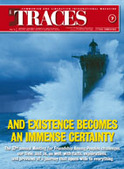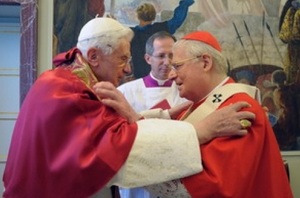 The Pope gave the pallium to the new archbishop of Milan, Angelo Cardinal Scola earlier today. The pallium is a symbol of communion between the wearer (normally metropolitan archbishops) the pope. Hence, it is more ecclesial in nature than liturgical, though the pallium is rarely worn outside of the celebration of the Mass. He can give it whenever and to whomever he wants. Custom of recent years is that the pope gives the pallium to those metropolitans who request it on the feast of Saints Peter and Paul. Nevertheless, this is a novel event that indicates a personal relationship between the cardinal and the pope.
The Pope gave the pallium to the new archbishop of Milan, Angelo Cardinal Scola earlier today. The pallium is a symbol of communion between the wearer (normally metropolitan archbishops) the pope. Hence, it is more ecclesial in nature than liturgical, though the pallium is rarely worn outside of the celebration of the Mass. He can give it whenever and to whomever he wants. Custom of recent years is that the pope gives the pallium to those metropolitans who request it on the feast of Saints Peter and Paul. Nevertheless, this is a novel event that indicates a personal relationship between the cardinal and the pope.
Saint Matthew, apostle
Matthew was an accomplished scribe, well versed in the law of God. With all his heart he studied the law of the Lord, with whose help he lived as he taught. The gospel of the glory of God is Matthew’s. With all his heart he studied the law of the Lord, with whose help he lived as he taught. (Responsory, Office of Readings)
The first reading from the New Testament for the feast of the Apostle Saint Matthew is stunningly beautiful Saint Paul’s letter to the Ephesians is a truly a love letter to the Church and this selection fittingly captures what it means to be an apostle of the Lord. Consider….
“I, the prisoner in the Lord, implore you to lead a life worthy of your vocation. Bear with one another charitably, in complete selflessness, gentleness and patience. Do all you can to preserve the unity of the Spirit by the peace that binds you together. There is one Body, one Spirit, just as you were all called into one and the same hope when you were called. There is one Lord, one faith, one baptism, and one God who is Father of all, over all, through all and within all.
Daniel M. Buechlein, Archbishop of Indianapolis, retires
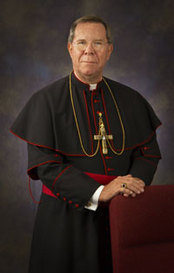 The Most Reverend Daniel Mark Buechlein, 73, has had his request for an early retirement from the Office of Archbishop of Indianapolis accepted by His Holiness, Pope Benedict XVI due increasing concerns of health. In recent months has been dealing with the effects of a mild stroke complicated by other issues like cancer.
The Most Reverend Daniel Mark Buechlein, 73, has had his request for an early retirement from the Office of Archbishop of Indianapolis accepted by His Holiness, Pope Benedict XVI due increasing concerns of health. In recent months has been dealing with the effects of a mild stroke complicated by other issues like cancer.
Saints Andrew Kim Taegon and Paul Chong Hasang and companions
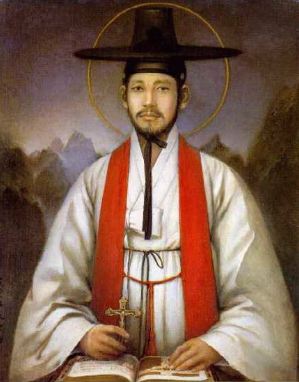 Today is the feast of the 19th century Saints Andrew Kim and Paul Hasang and their 103 companions. Kim is the first Korean born Catholic priest! He also followed his father as a martyr for the faith. Andrew was beheaded after being tortured in 1846. These saints were raised to the altars by Pope John Paul II in 1984.
Today is the feast of the 19th century Saints Andrew Kim and Paul Hasang and their 103 companions. Kim is the first Korean born Catholic priest! He also followed his father as a martyr for the faith. Andrew was beheaded after being tortured in 1846. These saints were raised to the altars by Pope John Paul II in 1984.
When true friendship effects change…
In June Dale Kuehne wrote a blog post “Change that believes in me” that speaks to the journey of taking a teaching position at Saint Anslem College (Manchester, NH) which is run by the Benedictine monks of the Abbey there. He doesn’t say it this way, but I do believe he points to something deeper than mere colleagueship: friendship. Perhaps all of us need to think more deeply what our friendships mean and how seriously we engage in them. I recommend this Dale Kuehne’s post….
Saint Robert Bellarmine
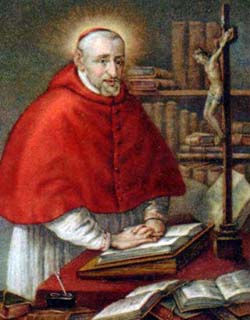
Today’s saint is special to me for many personal reasons, one of which is the fact that he gave himself to the Lord for his total and unreserved use. One can claim to like Bellarmine for his intellect, or the way he worked with controversial Catholic preachers and theologians and Protestants, or with Galileo, or his service to several popes, but what about his capacity to love the Lord and his neighbor, and what about his ability to know his limitations and his gifts, or his capacity to live the Beatitudes?
Each time I am in Rome I make a path to St Ignatius’s Church where Bellarmine is buried in the third chapel on the right as you face the main altar, near to his dear friend, Saint Aloyius Gonzaga, to pray for several intentions, among them are: theologians, the pope, the Jesuits, +Avery Robert Dulles and of course, myself.
The Roman Martyrology (2005) has this entry for Robert Bellarmine (1542-1621):
The feast of St. Robert Bellarmine, from the Society of Jesus, Doctor of the Church and bishop, who was outstanding at arguing the theological controversies of his day. He resigned his red hat, then gave himself wholeheartedly both to pastoral ministry in Capua, with great success, and took up very many challenges in defense of the doctrine of the faith at the Holy See in Rome.
Traces magazine: there’s an app for it on iPad
Great news with you: Traces is now available for iPad users and users of Apple’s latest OS, Lion. All that is necessary is to go to the App Store and enter “Traces” and you will find it.
There are many, pretty obvious, advantages to this new form, including receiving Traces as soon as it’s published, paying less for a subscription and the ability to easily tell friends who have an iPad.
I hope all of you Apple and iPad users will sign up, immediately, and tell your friends!
La Civiltà Cattolica has new leadership with Antonio Spadaro
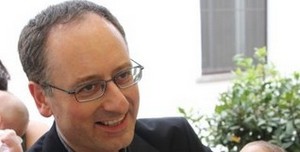 La Civiltà Cattolica, THE prestigious journal of opinion in Italy, and perhaps in very many ecclesial circles, has new leadership in Jesuit Father Antonio Spadaro. La Civiltà Cattolica has been at the service of the Church 162 years.
La Civiltà Cattolica, THE prestigious journal of opinion in Italy, and perhaps in very many ecclesial circles, has new leadership in Jesuit Father Antonio Spadaro. La Civiltà Cattolica has been at the service of the Church 162 years.
Our Lady of Sorrows
Why the Sorrowful Mother? Why do Catholics honor Mary, the Mother of God with the title of “Sorrows”? Is it an honor to be called such? Some good questions, I think. Mark Miravalle answers the question this way:
We could just as well ask St. Paul why he instructs all Christians to “make up what is lacking in the sufferings of Christ for the sake of his body, which is the Church” (Colossians 1:24).
We Christians, too, will suffer and do suffer. Our suffering has the capacity to release a portion of the infinite graces merited by Jesus at Calvary, what theologians call “objective redemption.” But as these redemptive graces of Jesus must be personally received by the human heart, every Christian has a role in this mysterious release and reception of grace which theologians call “subjective redemption.”
Mary alone, as the “New Eve” with Jesus the “New Adam,” participates in both objective and subjective redemption: both in the historic acquisition of redemptive grace and in the providential release of redemptive grace. Blessed John Paul would teach of his mother and ours that Mary’s intensity of suffering at Calvary was a “contribution to the redemption of all” (Salvifici Doloris, 25).
Pope to new bishops: balance your Christian life, be open to the laity
Newly ordained bishops are invited to Rome for a baby bishops’ camp each year. This year more than 100 new bishops came together for a series of workshops sponsored by the Congregations for Bishops and Eastern Churches on the theme of the Holy Spirit in the life of the bishop and the Church. The pope addressed the new bishops today. He exhorted them to live a balanced Christian life of prayer, study, work and rest. Moreover, he reminded the bishops that they are pastors of souls –not CEOs– and have to be concerned for the eternal destiny of those they are called to serve asking them at the same time to welcome the gifts the laity bring to the life of the Church. Every baptized person is brought into the inner life of the Trinity. In other words, the Pope told the bishops don’t act arbitrarily and be human: clericalism has no place in pastoral leadership.

